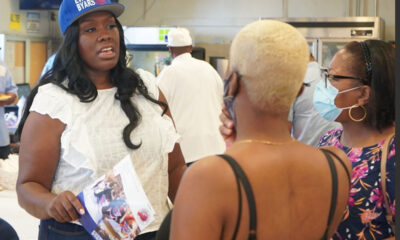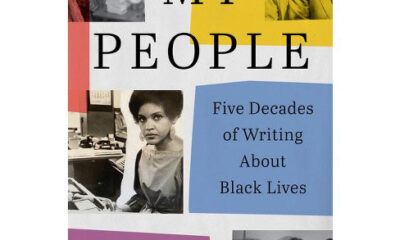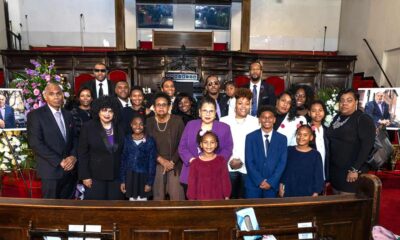Events
A Jubilant Time Indeed at CBL’s
20th Anniversary!
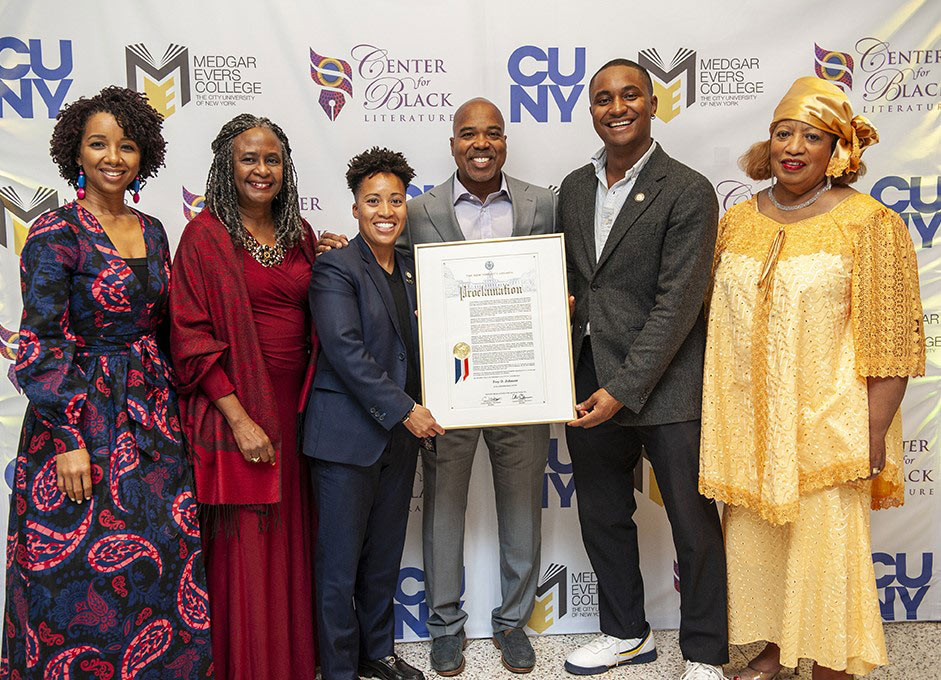
By Maitefa Angaza
The Center for Black Literature at Medgar Evers College celebrated two decades at a festive and fabulous 20th Anniversary Jubilee on October 20th! Authors, poets, other literary artists, scholars, readers, artists, producers, staff, and some students, were all there. They came to praise and honor the Center’s work and its founder, Dr. Brenda M. Greene. In large part, she founded the institution in 2002 to safeguard and expand the National Black Writers Conference Dr. John Oliver Killens created at the college in 1986. Dr. Greene took a year off from teaching to draw up the Center’s plans and support systems. Hailed as a passionate and persevering visionary, she is the Center’s executive director, head of the National Black Writers Conference, and a literature professor at the college.
“I’m very, very excited!” said Dr. Greene. “We are really doing the work that the late John Oliver Killens wanted. It’s also part of making sure that the public––our youth, our writers, our artists, our readers––all know what’s going on. They all are engaged in looking at how they can help shape the stories we tell to give us a counternarrative. We provide support for them in many ways through our conferences, symposia, and workshops. We’re providing platforms. It’s been a struggle, but I’ve gotten support. I have an excellent team, and the community has been very, very supportive!”
That support was very evident, and the joy at gathering for the College’s first social event of this kind in over two years was infectious. The campus venue was elegantly decorated, with the entry adorned by posters of some memorable conferences over the years. For the first writer’s conference, Dr. Killens had Toni Morrison, Maya Angelou, Ossie Davis, Ruby Dee, Sonia Sanchez, and others on hand. Over the years, and on this anniversary, the Center had many literary icons in the building to pay their respects, enjoy their artistic comrades, and feel their readers’ love.
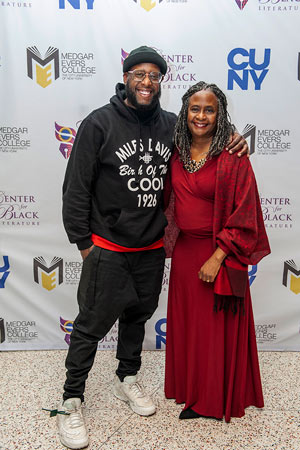
The evening’s honorees were Cheryl Willis, an author of five books and an Emmy Award-winning broadcast journalist on NY1, and Troy D. Johnson, founder, and president of AALBC.com (the African American Literature Book Club). They were both overjoyed.
“I’m the author of five books and was inspired by the amazing work of the Center for Black Literature,” said Wills. “Yes, I’m on television every day at NY1, but literature is my first love. And, of course, I’m not in the league of my idols, James Baldwin and Maya Angelou, but they inspired me to speak truth to power. So I want to thank you again for this amazing award. I will cherish it always.”
“It’s terrific to see so many friends and what really feels like family!” said Johnson. “It’s always a great thing to be honored by the people you’re really trying to serve. It’s been almost 25 years to the day––October of 1997––that I started, and I would never have thought it would be my livelihood. And being honored for it is just unimaginable!”
Revered poet, writer, and former professor Sonia Sanchez was the event’s Honorary Chair. Other honorary committee members (listed alphabetically) were: Dr. Greg E. Carr, department chair at Howard University School of Law; award-winning author Edwidge Danticat; Pulitzer-winner journalists Nikole Hannah-Jones and Karen Hunter; Talib Kweli, international touring rap artist and academic and literary icon Dr. Cornel West.
“Tonight we celebrate Black authors, poets, elders and their impact on African American culture,” said Dr. Sanchez. “We welcome your genius and intellect and love on this marvelous journey tonight.”
“It’s such an honor for me to be here!” said Danticat. “I write because I was told stories. I write because there were elders in my life; I write because there were libations because people prayed over my head and sang over my head. And I write because I was able to be in the community. The Center is so important, and the way we embrace young writers is so crucial!”
Celebrated rap artist Kweli spoke about his family and finding a job after quitting college.
“I’m just here celebrating with my family,” said Kweli. “My mother, Dr. Brenda Greene, and my father, Dr. Perry Greene, are here. My brother Jamal Greene. Dr. Cornel West mentioned that both me and my brother Jamal put out books last year. That’s a very tangible result of having parents like these… I walked up and down Flatbush Avenue, stopping at every store until I got a job. And the store where I got a job was Nkiru Books. CJ hired me. Nkiru books was started by Leothy Miller Owens.”
Dr. West spoke of the souls of Black folks.
“What a people! What a tradition! Dr. Greene, freedom fighter Greene! We need all that we can get in terms of illumination and inspiration in these neofascist times of escalating white supremacy and the expansion of militarism abroad, especially Africana and Africa. We lift our voices of jazz women and blues men… The best of our tradition that’s kept us going is our love of Black people.”
Audience members were listening and laughing, eating, dancing, and enjoying an evening designed for uplift. The contribution of the Center to literary excellence in Brooklyn and worldwide is outstanding! It’s affected not just college students but teens, elders, people outside of New York, and people in need of a bit of support and a lot of encouragement.
E. Ethelbert Miller, poet and activist, is appreciative but not surprised.
“I think Dr. Greene has done a wonderful job because she operates in the tradition of Professor John Oliver Killens,” said Miller. ”He always talked of being a long-distance runner. So when we look at the long years that Dr. Greene has contributed, she’s also been a long-distance runner, So I’m very happy that Killens was able to inspire someone like her.”
Maeshay Lewis agrees based on personal experience.
“I’m a former program director at the Center for Black Literature, and I loved my tenure,” said Lewis. “So I’m honored to be here now celebrating 20 years, and you know it’s born out of the vision of John Oliver Killens. I do comedy, and I love his satires! So for me, this is kind of reminiscent of The Cotillion. It was a pleasure to be a part of helping to nurture the careers of the authors and watching so many people come through our doors winning literary prizes. And just seeing us be excellent!”
Vice President Kamala Harris and Medgar Evers President Dr. Patricia Ramsey took full-page journal ads of congratulations. The Ricardo Strobert Quartet provided fantastic live jazz. Poet Mahogany L. Browne was epic, Michael Green offered a unique dramatic performance, and visual artist Ademola Olugebefola provided some beauty to make a good evening even better.
There was a live auction to help with fundraising, and the national writing contest winners were four young people embodying activism and social justice. Clarence D. Reynolds, director of literary programs at the college, was on the event steering committee, along with Lea Byrd, C. Zawadi Morris, Donna Hill, and others. Fashion icon Lana Turner was splendid in red, and the magic of giving, receiving, and appreciating, was a source of inspiration and strength.
“Our stories are rarely told elsewhere, and they aren’t told with the complexity that Black writers share them and tell them, or with the beauty, actually,” said Dr. Griffin. “So Dr. Greene is an institution builder, and she has helped to sustain a way of getting the word out about the beauty and complexity of the Black experience through our literature.”
“It feels good to be home!” said Browne. “I was in Dr. Greene’s children’s book class, which is how Woke Baby and Black Girl Magic even came to exist. She permitted me to see myself. And so when the haters came––because both titles are on the banned books list due to Fox News and some trolls––I knew that she set me on the right path. Because if they’re mad about it, they’re gonna have to stay mad.”
Nana Camille Yarbrough made this point in broad terms.
“We refused to let anything turn us around!” said Yarbrough. “It was about our storytellers telling stories, keeping us here. Storytellers are perception changers; storytellers are rearrangers; storytellers are mind-defoulers and problem solvers… Storytellers are power illustrators, tongue translators, keeping on the keepers, reaping on the reapers. I know you know what I’m talking about!”
“What the Center does in all of its programmings, it tells us our name, it gives us background,” said Dr. Madhubuti. He’s one of Dr. Greene’s mentors and has been involved in literary work, a publishing company, education, and more in Chicago for decades.
Dr. Haki Madhubuti shared via video that the Center names us and provides a background to our creative endeavors. He’s one of Dr. Greene’s mentors and has been involved in literary work, a publishing company, education, and more in Chicago for decades.
“Fundamentally, it defines us,” said Dr. Madhubuti. “I’m not surprised that this Center has lived so long and continues to live. But like all of our centers, she has to fight day and night for funding. And the major reason she does this, and most certainly the major reason I do this, is that we love Black people.”
Dr. Greene does love the people and the work. She remains on the job with her focus on bright objectives.
“All of these writers should be a natural part of our curriculum, a natural part of American and Western literature,” said Dr. Greene. “So my goal as someone who is organizing conferences, and someone who teaches and someone who realizes the importance of seeing yourself reflected in the books that you read, I want to bring all of that together!”




